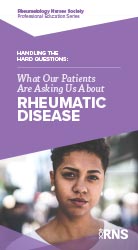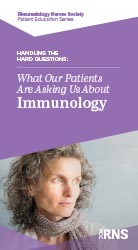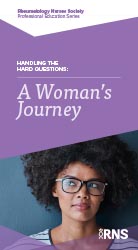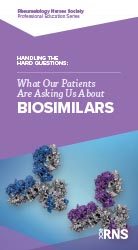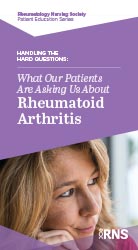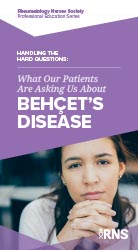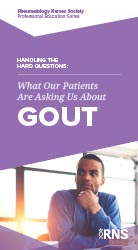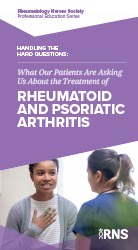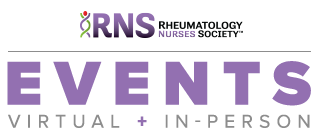Abstract Submission, Review, and Acceptance
The Rheumatology Nurses Society (RNS) invites you to submit your latest rheumatology research, scholarship, practice change, and/or quality improvement projects in an abstract format for the chance to display and present your poster at the 2025 18th Annual RNS Conference.
Please make sure to read through the following information to understand the details involved for abstract application, submission, and presentation.
The form to submit an abstract is at the bottom of this page.
Key Dates & Deadlines
Submission
Deadline:
June 15, 2025
Review
Notifications:
July 1, 2025
Conference
Dates:
TBD
2025 RNS Abstract Submission Guidelines
- Abstract submissions are open to both RNS members and non-members.
- The lead author must ensure that all co-authors have provided their full consent and that any necessary institutional clearances have been obtained before submission.
- Industry submissions are welcomed
Submissions should align with one of the following rheumatology-focused categories:
- Clinical Practice and Patient Care: Innovative approaches, case studies, or best practices in nursing and patient management.
- Education and Professional Development: New methodologies or initiatives for nursing education and workforce development.
- Research and Evidence-Based Practice: Original research findings relevant to rheumatology nursing or patient care.
- Quality Improvement: Systematic efforts to enhance care delivery, patient outcomes, or clinical operations.
- Encore Abstracts: Previously published or presented work to an audience of healthcare professionals
- Trials in Progress (TiP): Ongoing trials that explore innovative treatments, methodologies, and approaches in rheumatology without sharing results or preliminary data
- Late-Breaking Abstracts: High-impact studies or initiatives that present novel findings or developments.
Abstracts must be organized into the following sections:
- Background: Provide the rationale or context for the study, project, or initiative. Highlight its significance to rheumatology nursing or patient care.
- Methods: Describe the methodology, including data collection, population studied, and any interventions applied. Ensure clear and concise explanations of processes.
- Results: Summarize key findings or anticipated outcomes. If the project is ongoing, include expected results and implications for rheumatology care.
- Conclusion/Discussion: Explain the potential impact of your findings on clinical practice, nursing education, or patient outcomes.
- Word Limit: Abstracts must not exceed 350 words, excluding the title and author details.
- Title: Should be concise, descriptive, and relevant to the submission topic.
- Author Information: Include names, credentials, and institutional affiliations of all authors. The lead author should also provide a headshot and brief bio for publication purposes.
- Tables and Figures: Abstracts may include up to two tables or figures to illustrate findings. Ensure they are high-quality and clearly labeled.
- All submissions must be completed via the online submission portal by the specified deadline.
- Abstracts will undergo a blind review process by the RNS Abstracts and Posters Committee.
- Abstracts will be evaluated based on the following criteria:
- Alignment with rheumatology nursing and conference goals.
- Innovation and significance of the study or project.
- Clarity, completeness, and adherence to submission guidelines.
- The lead author will receive notification of the review outcome by July 1, 2025.
- Selected abstracts may be presented as posters or oral presentations during the annual conference.
- Presenters grant permission for their work, including photos and posters, to be included in RNS publications or on the RNS website unless otherwise stated.
For accepted abstracts, the following tips will ensure a professional and engaging poster presentation:
- Keep it Simple: Limit content to key ideas and findings. Use concise text and avoid clutter.
- Visual Flow: Arrange content to read from left to right and top to bottom, using lines, frames, or arrows to guide the viewer.
- Typography: Use no more than three font sizes (e.g., title, headings, body text). Avoid all uppercase letters, which are harder to read.
- Graphics: Incorporate graphs, charts, and photos to communicate data visually.
- Design: Use color strategically to highlight important information but avoid overloading the poster with unnecessary decoration.
- Engagement: During the designated Poster Presentation session, presenters will receive tickets to distribute to attendees who engage by asking questions. Each presenter may give one ticket per attendee. Attendees will use these tickets to participate in prize drawings, encouraging active engagement and interaction.
Technical Aspects Checklist:
- Include title, authors, and institutional affiliations.
- Use photographs and visuals to enhance comprehension.
- Ensure all content can be absorbed in five minutes or less.
- Posters should be formatted for display on foam boards (materials provided).
Submission Category Guidelines
- Abstract Format:
- Title: Should be concise, descriptive, and directly related to the content.
- Sections:
- Background
- Methods
- Results (if applicable)
- Conclusion/Discussion
- Word Limit: 350 words (excluding title, author details, and references).
- Figures and Tables: Limit of two, with clear labels and captions.
- Eligibility:
- Both members and non-members of RNS may submit abstracts.
- Multiple submissions are permitted.
- Review Process:
- All abstracts will undergo a blind review by the RNS Abstracts and Posters Committee.
- The evaluation will focus on:
Relevance to rheumatology nursing.
Innovation and potential impact.
Clarity and adherence to guidelines.
- Notification of Outcomes:
- Lead authors will be notified of acceptance or rejection by July 1, 2025.
- Overview: Submissions should highlight innovative approaches, best practices, or challenges in delivering patient care in rheumatology nursing. This category focuses on practical, patient-facing interventions that improve care outcomes.
- Examples:
- Case studies of novel care techniques.
- Implementation of patient-centered care models.
- Strategies to address barriers to care, such as disparities or social determinants of health.
- Guidelines:
- Describe the clinical problem, the intervention, and its impact on patient outcomes.
- Highlight evidence-based methods or innovative solutions.
- Discuss applicability to broader clinical settings.
- Overview: Submissions should explore initiatives, strategies, or tools that advance the professional growth of rheumatology nurses and advanced practice providers (APPs).
- Examples:
- New methodologies in nursing education or training programs.
- Workforce development initiatives.
- Leadership or mentorship programs tailored to rheumatology professionals.
- Guidelines:
- Define the educational need or gap and the intended audience.
- Detail the program design, including curriculum components and delivery methods.
- Provide evidence of effectiveness, if available (e.g., feedback or outcomes).
- Overview: This category focuses on original research or evidence-based projects relevant to rheumatology nursing or patient care. Submissions should contribute to the body of knowledge in rheumatology.
- Examples:
- Studies examining the efficacy of new nursing interventions.
- Data on patient outcomes from innovative care strategies.
- Research exploring the role of nurses in multidisciplinary care.
- Guidelines:
- Clearly state the research question or hypothesis.
- Provide details on methodology, sample population, and statistical analysis.
- Present findings clearly and concisely, focusing on their implications for practice.
- Overview: Submissions in this category should address systematic efforts to improve clinical workflows, patient safety, or care delivery in rheumatology settings.
- Examples:
- Initiatives to streamline patient care coordination.
- Efforts to reduce medication errors in rheumatology clinics.
- Programs that enhance communication between care teams.
- Guidelines:
- Describe the QI process, including problem identification, intervention design, and metrics used to measure success.
- Emphasize the reproducibility and scalability of the initiative.
- Highlight measurable improvements in quality, safety, or efficiency.
- Overview: Encore abstracts allow authors to present previously published or presented work to the RNS audience. Submissions must clearly disclose where and when the work was first presented.
- Examples:
- Research previously presented at another medical or nursing conference.
- Published findings relevant to rheumatology nursing practice.
- Guidelines:
- Provide the original abstract or publication details for context.
- Highlight why the work remains significant or relevant to the RNS community.
- Ensure content adheres to RNS’s abstract formatting and submission requirements.
- Trial Status:
- Submissions are limited to ongoing clinical trials that have not yet reached their prespecified endpoints for analysis. No clinical endpoint or other data should be reported.
- Trials must be actively recruiting or open for recruitment as of the abstract submission date.
- Acceptable Phases:
- Trials in any phase (I, II, III) that address clinical interventions, supportive care, or nonpharmacologic interventions relevant to rheumatology may be submitted.
- Structure and Content:
- Submissions must be organized into two main sections: Background and Methods.
- Background:
- Provide the scientific background and rationale for the study, including relevant preclinical and previously published clinical data that informed the trial design.
- Describe any correlative studies that add context to the trial.
- Methods:
- Describe the trial design and statistical methods, highlighting innovative aspects.
- Detail the treatment or intervention planned.
- List major eligibility criteria, with emphasis on unique or unusual aspects.
- Provide the clinical trial registration number (e.g., ClinicalTrials.gov).
- Outline the current enrollment status without including results or endpoint data. Acceptable examples include:
- “10% of planned patients enrolled as of [month/year],” or
- “Enrollment began in [month/year]; the trial continues as planned.”
- If applicable, mention biomarkers, companion diagnostics, or any significant protocol amendments relevant to the study’s progress.
- Prohibited Content:
- The inclusion of any preliminary results or clinical endpoint data is strictly prohibited.
- Proprietary drug names should not be used.
- Submissions that include clinical outcomes or analysis will be deemed ineligible and may be withdrawn
- Additional Notes:
- Novelty of Design: Emphasize how the trial design may contribute to advancements in rheumatology care or patient outcomes.
- Recruitment Insights: Authors are encouraged to share any experiences or challenges with recruitment, as well as adjustments to inclusion/exclusion criteria if relevant to the study design
- Overview: This category is reserved for high-impact studies or initiatives that present novel findings or developments not available before the regular submission deadline.
- Examples:
- Recent results from groundbreaking studies or clinical trials.
- New data from recently completed QI initiatives or research projects.
- Guidelines:
- Submissions must provide a compelling rationale for why the work was not completed by the regular deadline.
- Include all relevant details on methodology and findings while adhering to the same structure as other categories.
- Late-breaking submissions must demonstrate significance and relevance to rheumatology nursing.
